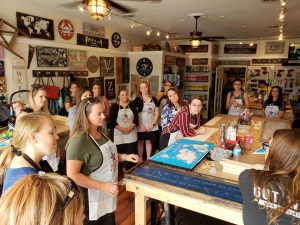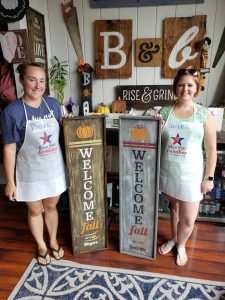Published: May 24, 2021
Adjusting to Life as a Military Connected Caregiver: Finding a Community of Support
There are 5.5 million military and veteran caregivers in the U.S. today. Two of every five veteran family respondents to the 2020 Military Family Lifestyle Survey (43%) reported they were an unpaid caregiver; a quarter of these caregivers (27%) are caring for a spouse or partner who is a veteran. These are individuals supporting the journey of the wounded warriors who have laid their bodies and minds on the line to protect our freedoms. While many civilians may remember to thank veterans for their service, the caregivers who support them aren’t recognized nearly enough. Caregivers are navigating complex challenges regularly, often time without needed support.
Take Hillary, for example. She’s a veteran caregiver and mother of two. Hillary is no stranger to the difficulties of being a caregiver. She played that role in her step-father’s life as a teenager, helping him cope with his PTSD and associated addictions. When she became a caregiver for her husband Matthew, she knew it would mean adjusting how and what they did on a regular basis. “I have learned that you have to be patient with your wounded warrior and learn to adjust to their needs,” Hillary shared. “With the trauma they have been through, you have to have the mindset of thinking ahead and observing the right course of action to take. You have to think about how every situation will impact their mental state. The things that you used to do may not be something they can do or want to do because of the fear of setting off a trigger.”
 That’s a big, life-changing adjustment to make. Without a strong support system, navigating life as a caregiver can feel overwhelming and isolating. In fact, in the 2020 Resilience Under Stress Study (RUSS; conducted during the height of the COVID-19 pandemic), caregivers had fewer social resources than their non-caregiver peers: fewer friends, fewer people to ask for a favor and less social support. In Hillary’s case, she met her husband after he was already detached from the military. She didn’t have a network of other military-connected caregivers to lean on for advice and strength. And the pandemic only intensified the situation. “When the pandemic hit, we lost our normal outlets and activities that help us day to day,” Hillary said. “Being around each other 24/7, especially given his struggles with PTSD, has really made our communication difficult. We call it cabin fever. It’s definitely put a toll on our mental health.” The RUSS also showed that a greater proportion of caregivers reported “major” or “severe” COVID-19 impacts on their happiness, mental health, employment, financial situation, and personal health than their non-caregiver peers.
That’s a big, life-changing adjustment to make. Without a strong support system, navigating life as a caregiver can feel overwhelming and isolating. In fact, in the 2020 Resilience Under Stress Study (RUSS; conducted during the height of the COVID-19 pandemic), caregivers had fewer social resources than their non-caregiver peers: fewer friends, fewer people to ask for a favor and less social support. In Hillary’s case, she met her husband after he was already detached from the military. She didn’t have a network of other military-connected caregivers to lean on for advice and strength. And the pandemic only intensified the situation. “When the pandemic hit, we lost our normal outlets and activities that help us day to day,” Hillary said. “Being around each other 24/7, especially given his struggles with PTSD, has really made our communication difficult. We call it cabin fever. It’s definitely put a toll on our mental health.” The RUSS also showed that a greater proportion of caregivers reported “major” or “severe” COVID-19 impacts on their happiness, mental health, employment, financial situation, and personal health than their non-caregiver peers.
The mental and emotional toll caused by being a caregiver is why it’s so important that we provide support. When caregivers feel connected and heard, they can be strengthened and encouraged to thrive in their role supporting their wounded warrior. Each year, with the help of our amazing partner, Veterans United, Blue Star Families brings together military connected caregivers to take part in self care workshops and activities in their local communities. This allows for a time where they can focus on themselves and gives them an opportunity to connect with other caregivers. The goal is to create a network, provide valuable training to best support their mental wellbeing, and provide a much needed outlet. This year, despite the challenges and restrictions created by the pandemic, we knew that it was absolutely vital that we continued to offer our military-connected Caregivers support. To do that, we turned to a cohort model that meets virtually for workshops throughout the year and includes a caregivers box that compliments each workshop.
To lead the virtual workshops, Vicky, Senior Manager, National Chapter and Programs for Blue Star Families, recruited Tammy Meyer, a Military Spouse and Professional Life Coach. Together Vicky and Tammy developed self care events based on survey data and feedback strategically designed to impact the lives of the Caregivers. Hillary and 49 other caregivers will complete these workshops where they will learn to diffuse stress and anxiety, identify personal values and goals, and finally determine an ideal picture for their lives and develop a plan to achieve it. They will gain the training and tools needed to focus on their well-being in order to better support their families. “Blue Star Families gives us the chance to talk to people who can help us get the resources needed as caregivers,” Hillary shared. “It’s also a great way to get to know other families that are experiencing the same difficulties. You become close with the other families and share stories. It feels like a blended family to lean on without judgment.”
Amy Goyer, National Family and Caregiving Expert for AARP, recently commented, “No one is meant to do it alone all of the time.” Amy is a caregiver herself and knows first hand what the challenges are like. It can be hard opening up about something so personal, like the trials and tribulations of being a military caregiver. Still it’s so important to do so. Because Amy is right, we aren’t meant to do it alone all the time. We all need to build a community and build our tribe so we can continue to thrive. Blue Star Families helps families to do just that. By providing caregiver toolkits full of information and resources, hosting Caregiver Coffee Connects to allow families to share and learn from one another, and by creating the Caregiver Cohort where families can learn from an expert; Blue Star Families is proud to be the connector that allows families to find that network of support.
To learn more about the resources available to military caregivers, please visit our website www.bluestarfam.org/for-mil-families/wellness.
Posted In:

